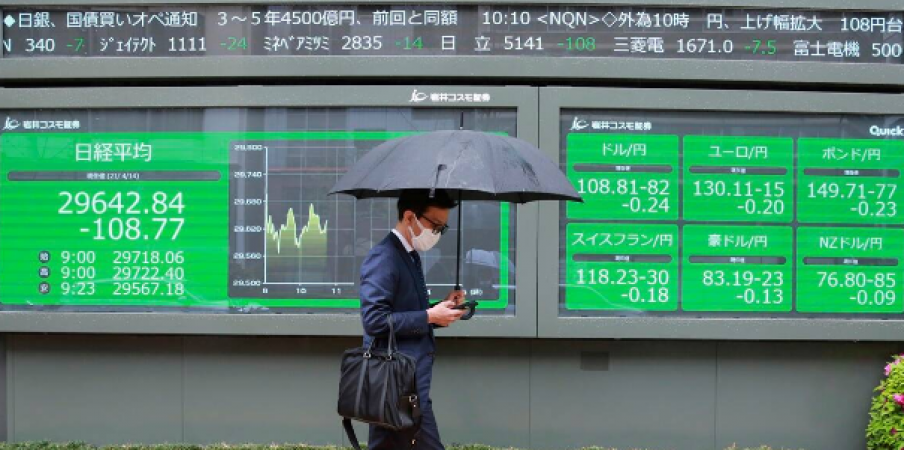
Tokyo: Following news that US inflation was slowing, even though it is still too high, Asian shares traded in choppy fashion on Thursday.
The benchmark Nikkei 225 index for Japan fell by almost 0.1% to 29,102.25 in afternoon trading. The S&P/ASX 200 in Australia decreased 0.1% to 7,249.00. The Kospi index for South Korea rose 0.1% to 2,499.99. The Hang Seng in Hong Kong fell 0.4% to 19,693.89 while the Shanghai Composite barely changed, rising less than 0.1% to 3,319.53.
The Asian region, in particular, continues to pay close attention to concerns about the Chinese economy, with Tuesday's trade data serving as the most recent source of concern.
Also Read: Govt lowers e-invoicing threshold to Rs. 5 crore firms as of August 1.
According to Stephen Innes, managing partner at SPI Asset Management, "China could be on the verge of entering a deflationary funk similar to the one that Japan is starting to emerge from."
The S&P 500 index on Wall Street increased by 0.2% to 4,129.20 after fluctuating between gains and losses throughout the day. The Nasdaq composite increased 1% to 12,306.44, while the Dow Jones Industrial Average fell 0.2% to 33,487.87.
After the highly anticipated report revealed that consumer inflation edged down to 4.9% last month, its lowest level in two years, bond prices increased. That was slightly better than economists expected, and other underlying measures of inflation also came in very close to forecasts.
Also Read: TASI increases as trading turnover reaches $1.63 billion at the closing bell
Wall Street continues to believe that the Federal Reserve can decide to leave interest rates alone at its next meeting in June as a result. A pause would give the economy and financial markets some breathing room since it hasn't raised rates at a meeting in more than a year.
According to Ross Mayfield, an analyst for investment strategy at Baird, "the worry coming in was that it would be hotter than feared." Although not particularly exciting, I believe there was enough good news included that it shouldn't have a significant impact on the Fed or the direction of the economy.
In an effort to reduce inflation, the Fed has raised rates rapidly. However, high rates achieve this by generally lowering investment prices and slowing the entire economy. They have already lowered stock prices, agitated the banking system, and weighed down the economy to the point where many investors anticipate a recession this year.
According to data from CME Group, traders increased their belief that the Fed will keep interest rates unchanged in June as a result of the report to almost 94%.
Big Tech and other high-growth stocks, which stand to gain the most from an easing of interest rates, led the way on Wall Street. The S&P 500 was driven higher by Microsoft's 1.7% gain and Amazon's 3.3% increase.
Inflation is still significantly higher than the Federal Reserve's 2% target and is continuing to put pressure on households throughout the economy, especially those with the lowest incomes.
This reporting season, which is almost done, has seen the majority of the S&P 500 companies beat profit projections thus far. However, they're still on track to report overall earnings that are down from a year ago, which would be the second consecutive quarter that this has occurred.
The bond market saw yields drop as anticipation for a Fed rate pause increased.
The 10-year Treasury's yield decreased from 3.52% to 3.43%. It aids in determining interest rates for major loans like mortgages. The two-year Treasury yield, which fluctuates more in response to anticipated Fed action, dropped from 4.03% to 3.90%.
Also Read: Bahrain's economy needs to diversify, according to the industry minister
Along with concerns about interest rates and inflation, some segments of the bond market are also experiencing volatility due to worries that the United States government is edging closer to a potential debt default. A default would be disastrous for the economy and financial markets because that has never happened before.
Benchmark U.S. crude increased by 70 cents to $73.26 per barrel in the energy market. Brent crude, the international standard, added 75 cents to $77.16 a barrel.
The American dollar was little changed in currency trading at 134.24 Japanese yen, down from 134.28 yen. The price of the euro dropped from $1.0984 to $1.0980.